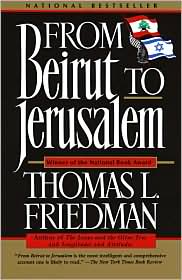 Sad to say, but a year ago, you probably could have caught me uttering these words and looking a lot like this. Until I decided to live in Jerusalem, I really knew very little about the current situation in the Middle East (despite my father's 14-year upbringing there).
Sad to say, but a year ago, you probably could have caught me uttering these words and looking a lot like this. Until I decided to live in Jerusalem, I really knew very little about the current situation in the Middle East (despite my father's 14-year upbringing there).In preparing to take this trip, I decided to save myself and my family name from further embarassment and acquired a few books to educate myself on the "impossible to understand completely" history that is the Israeli-Palestinian conflict. The book, "From Beirut to Jerusalem" by Thomas Friedman has been my first tackle. While taking almost an hour to read the first 18-pages (a very good attempt at an overview of the major conflicts and settlements over the last 125 years) I began to ask myself why most young Americans don't care about these problems.
It seems that unless an American has a personal tie to the Middle East (and not even in that case--sorry Dad), the battles and attacks that happen there do not interest them. All books and newspaper articles on the matter seem to offer unpronouncable names and too-often-changing titles and locations that unless you promise yourself not to miss a story, it can be quite difficult to follow. How about a required GE at every college titled "Necessary Background of Today's Current Events"?
For young people especially, with ever-changing schedules and priorities, a daily commitment to reading the news can be difficult to make, especially if they do not know the history. How many 18-24 year-olds do you know that are up to date on current events in the Middle East? Unfortunately, not enough. But, can you blame us?
So, how then and why should Americans give their time and energy to understanding this Middle Eastern problem? Or should they? I would love to hear your answers.



